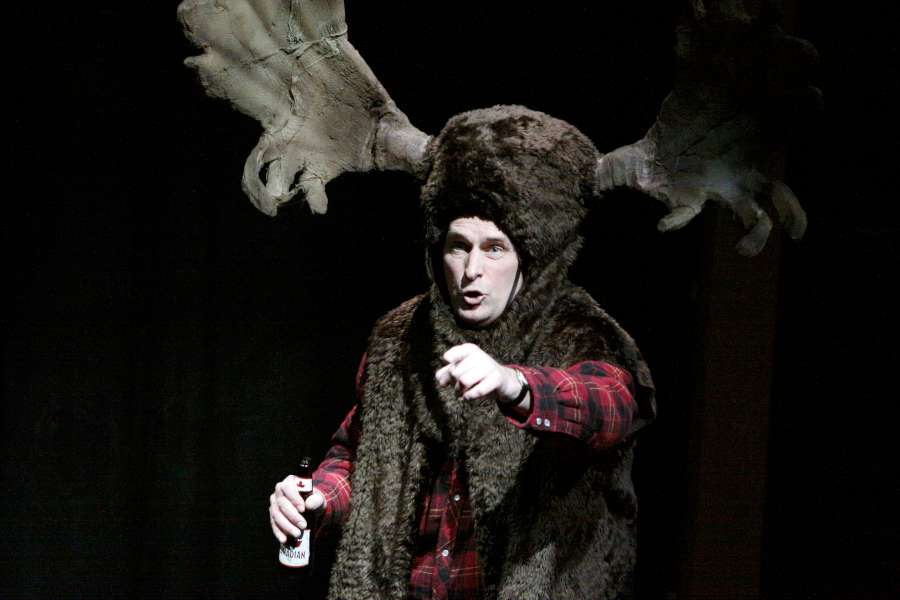Moose On The Loose, a comedy about an Italian family and a Canadian moose that meet up in Way Up Bay, is loosely based on true events. Way Up Bay is a fictional small town in Northern Ontario, near the icy cold shores of Lake Superior, where temperatures can dip to minus forty-Celsius and wind chill off the lake is just icing on the cake. Lets just say it’s any Canadian city, where temperatures drop below freezing.
 One Sunday afternoon, a few years back, my mother told me via a telephone conversation about an incident which had occurred in my hometown. A moose wandered out of the bush from across the street and made its way into her Polish neighbor’s back yard where it got stuck in a camper trailer. While the moose tried to figure out its next move, the locals became nervous and restless because the entire neighborhood was on lockdown. Police, Firemen, and the local News were called in. The Ministry of Wildlife Services arrived to deal with the confused moose. This made for quite an exciting day in an otherwise uneventful small town. The moose was finally sedated and transported back to the bush where I hope it made a full recovery and was reunited with its family.
One Sunday afternoon, a few years back, my mother told me via a telephone conversation about an incident which had occurred in my hometown. A moose wandered out of the bush from across the street and made its way into her Polish neighbor’s back yard where it got stuck in a camper trailer. While the moose tried to figure out its next move, the locals became nervous and restless because the entire neighborhood was on lockdown. Police, Firemen, and the local News were called in. The Ministry of Wildlife Services arrived to deal with the confused moose. This made for quite an exciting day in an otherwise uneventful small town. The moose was finally sedated and transported back to the bush where I hope it made a full recovery and was reunited with its family.
The event got me thinking about how displaced that moose must have felt. I reflected on my parents and many others like them who had come from other parts of the world as immigrants only to end up in a place like Way Up Bay where they too felt displaced. I then thought about myself, the daughter of immigrant parents, and how displaced I felt growing up in an Italian household while trying to fit in with my Canadian friends. And then I realized that whether you are a moose on the loose, a child of immigrant parents, or an Italian from Calabria living in Way Up Bay, blending in is never easy.
Moose On The Loose is a full length examination of the Tappino family beginning with patriarch Rodolfo, matriarch Pina, their daughter Maria and her husband Giuseppe, who left the Mediterranean warmth of Calabria, in southern Italy, in the early 60’s for a better life in America and ended up in Moose country or as their four Canadian born children like to call it, the "frozen tundra". Way Up Bay is not what the Tappino’s envisioned at the beginning of their long voyage across the Atlantic Ocean, but it’s where they settled, raised a family and eventually even called home.
The play is more moose-as-metaphor when it comes to understanding the assimilation process for the immigrant cultures in Canada. It’s about change… personal, cultural and generational. More specifically, it is about the courage to change and what change other than death requires more courage than leaving ‘home’ to immigrate to another country, language and culture?
There are two approaches to this subject and I have chosen humor over melodrama. Moose falls into the category of idiosyncratic (character-driven) humanist comedy. Think George S. Kaufman ('You Can't Take it With You') and the films of Sicilian born Frank Capra where behavior is the story and every character is given time to be seen, heard and remembered. Whether they stand at the center or the edge of the narrative action, each is important. What they say and how they say it affects all of us.
With all that is currently happening in the world and in Canada with regards to immigration, Moose On the Loose is a very timely piece. In fact, in Sudbury, at STC, several Syrian refugees were invited to see the show. It was the very first piece of live theatre they were seeing in Canada. I was so moved when I heard their interview on CBC Radio. One of them said he loved the show because it made him laugh, but that to be funny and make him laugh was not enough, it had to be about something and Moose was about something important. This is why I want to continue to bring this play across Canada and the United States, because both are North American countries that were built by immigrants and are ethnically very diverse.
*A note on language in the script and on stage. I have carefully observed broken English and some Italian in order to differentiate the generational layers within the family and to address the courage it takes to live in a language culture that is not your own.
